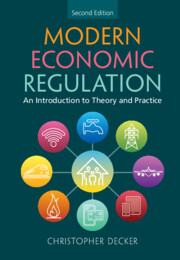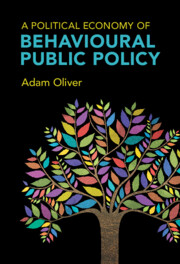Refine search
Actions for selected content:
47 results
3 - Elements of Economics
- from Part I - Introduction and Background
-
- Book:
- Quantum Modelling of Economic and Financial Systems
- Published online:
- 19 December 2025
- Print publication:
- 22 January 2026, pp 47-57
-
- Chapter
- Export citation
Opportunity cost neglect: a meta-analysis
-
- Journal:
- Journal of the Economic Science Association / Volume 9 / Issue 2 / December 2023
- Published online by Cambridge University Press:
- 17 January 2025, pp. 176-192
-
- Article
-
- You have access
- Open access
- HTML
- Export citation
The tacit dimension and behavioural public policy: insights from Hayek and Polanyi
-
- Journal:
- Behavioural Public Policy / Volume 9 / Issue 3 / July 2025
- Published online by Cambridge University Press:
- 02 December 2024, pp. 575-592
-
- Article
-
- You have access
- Open access
- HTML
- Export citation
Chapter 8 - Nudging as a Tool of Market Design and Profitability: Performativity in the Age of Behavioural Economics
- from Part II - Post-Performative Approaches to Studying Markets
-
-
- Book:
- Market Studies
- Published online:
- 22 November 2024
- Print publication:
- 21 November 2024, pp 127-143
-
- Chapter
- Export citation
The economics of cognitive institutions: mapping debates, looking ahead
-
- Journal:
- Journal of Institutional Economics / Volume 20 / 2024
- Published online by Cambridge University Press:
- 13 September 2024, e28
-
- Article
- Export citation
2 - What Have We Learned from Behavioural Economics for the COVID-19 Response?
- from Part I - Evidence from Experiments and Behavioural Insights
-
-
- Book:
- Behavioural Economics and Policy for Pandemics
- Published online:
- 31 January 2025
- Print publication:
- 02 May 2024, pp 11-41
-
- Chapter
- Export citation
1 - Behavioural Economics and Policy for Pandemics
-
-
- Book:
- Behavioural Economics and Policy for Pandemics
- Published online:
- 31 January 2025
- Print publication:
- 02 May 2024, pp 1-8
-
- Chapter
- Export citation
3 - Adaptation, COVID-19, and Climate Change
- from Part I - Evidence from Experiments and Behavioural Insights
-
-
- Book:
- Behavioural Economics and Policy for Pandemics
- Published online:
- 31 January 2025
- Print publication:
- 02 May 2024, pp 42-56
-
- Chapter
- Export citation
7 - Behavioural Economics and Regulation
- from Part II
-
- Book:
- Modern Economic Regulation
- Published online:
- 25 May 2023
- Print publication:
- 08 June 2023, pp 197-230
-
- Chapter
- Export citation
2 - The Perennial Question: Why Regulate?
- from Part I
-
- Book:
- Modern Economic Regulation
- Published online:
- 25 May 2023
- Print publication:
- 08 June 2023, pp 11-42
-
- Chapter
- Export citation

Modern Economic Regulation
- An Introduction to Theory and Practice
-
- Published online:
- 25 May 2023
- Print publication:
- 08 June 2023
-
- Textbook
- Export citation
Gods are watching and so what? Moralistic supernatural punishment across 15 cultures
-
- Journal:
- Evolutionary Human Sciences / Volume 5 / 2023
- Published online by Cambridge University Press:
- 12 May 2023, e18
-
- Article
-
- You have access
- Open access
- HTML
- Export citation
Strengthening Environmental Decision Making through Legislation: Insights from Cognitive Science and Behavioural Economics
-
- Journal:
- Transnational Environmental Law / Volume 12 / Issue 2 / July 2023
- Published online by Cambridge University Press:
- 04 May 2023, pp. 295-317
-
- Article
-
- You have access
- Open access
- HTML
- Export citation
Cognitive Bias
-
- Article
- Export citation
Reflections on applying behavioural insights to crime: a guide for behavioural scientists and criminologists in search of policy unicorns
-
- Journal:
- Behavioural Public Policy / Volume 7 / Issue 3 / July 2023
- Published online by Cambridge University Press:
- 23 March 2023, pp. 744-757
-
- Article
- Export citation
Voluntariness and the bounds of cost–benefit analysis
-
- Journal:
- Behavioural Public Policy / Volume 7 / Issue 4 / October 2023
- Published online by Cambridge University Press:
- 27 February 2023, pp. 954-962
-
- Article
-
- You have access
- Open access
- HTML
- Export citation

A Political Economy of Behavioural Public Policy
-
- Published online:
- 16 February 2023
- Print publication:
- 23 February 2023
How behavioural economics does and can shape public policy
-
- Journal:
- The Economic and Labour Relations Review / Volume 26 / Issue 2 / June 2015
- Published online by Cambridge University Press:
- 01 January 2023, pp. 339-346
-
- Article
- Export citation
Self-interested learning is more important than fair-minded conditional cooperation in public-goods games
-
- Journal:
- Evolutionary Human Sciences / Volume 4 / 2022
- Published online by Cambridge University Press:
- 17 October 2022, e46
-
- Article
-
- You have access
- Open access
- HTML
- Export citation
3 - Sanctions on Legal Persons
- from Part I - General Chapters
-
-
- Book:
- The Cambridge Handbook of Competition Law Sanctions
- Published online:
- 29 July 2022
- Print publication:
- 23 June 2022, pp 37-53
-
- Chapter
- Export citation
